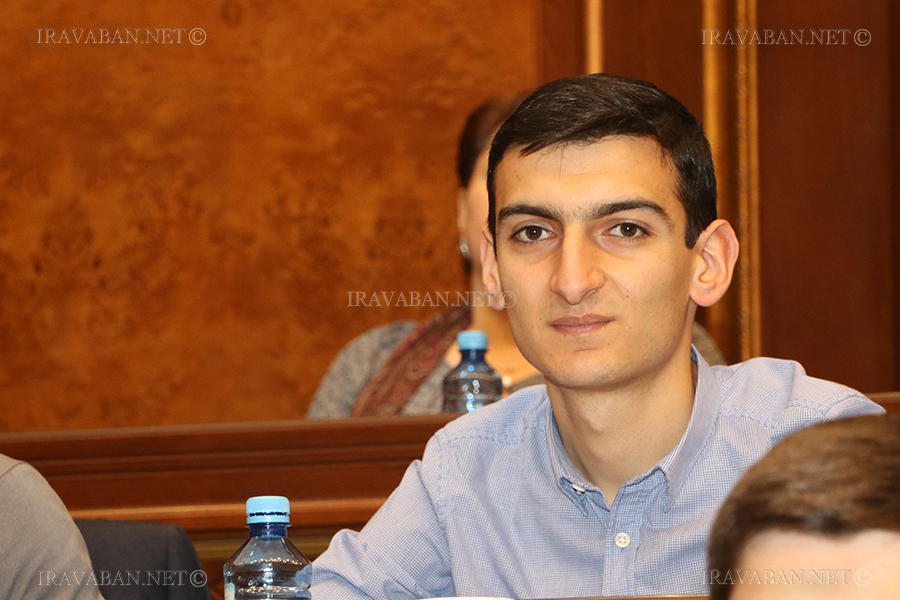Infocom.am has interviewed Narek Yenokyan, a Lawyer/Expert at the CSO Anti-Corruption Coalition of Armenia about the Anti-Corruption Policy Council created by the Prime Minister’s recent decision and the current issues.
– Mr. Yenokyan, what role do you think can the Anti-Corruption Policy Council led by the Prime Minister play while implementing effective anti-corruption campaign?
– First of all, I would like to note that the Anti-Corruption Policy Council, even though it has recently been created by the Prime Minister’s corresponding decision, does not differ in its format and function from the previously functioning Anti-Corruption Council. So, I do not share the view that the Council has just been created.
As regards the effectiveness and role of the Council in the fight against corruption, I think that with the envisaged legal provisions, it will hardly be possible to ensure effectiveness and impact of the Council on anti-corruption reforms.
Particularly, when we get acquainted with the decision, it becomes clear that it has had an obviously directed nature; namely, having the aim to remove the CSO Anti-Corruption Coalition of Armenia, the Public Council and the Union of Communities of Armenia from the Anti-Corruption Policy Council. Moreover, the latter ensured the participation of local self-governance bodies in the council. In addition, with the adopted legal regulations, local self-governance bodies are not currently involved in the council.
I think these guidelines have been initiated by specific individuals or groups. Former civil society representatives currently hold senior positions in the Prime Minister’s office. The latter fir a long time could not accept the reality and the fact that the CSO Anti-Corruption Coalition of Armenia is the forerunner of anti-corruption fight and initiator of the reform. The Coalition has gained recognition also on international platforms. And so, I think, these processes are directed by them, as no legal justification or argument has been laid down in the basis of the decision.
It follows that such a practice is a throwback in the fight against corruption and does not stem from the values of the “velvet revolution”. In my opinion, the revolutionary society had the expectation to have a democratic Council with the participation of major players in the field.
– Will the Council to be formed differ with its powers and role from the Anti-Corruption Council, which has been suspended by the decision of the RA Prime Minister recently?
– First of all, I would like to mention that I am convinced that there was no need for the creation of a new council, as the main functions of the independent anti-corruption body to be created would be to develop an anti-corruption policy.
Returning to your question, let me mention that by studying the previous powers and functions of the Anti-Corruption Council and comparing with the powers and functions of the Anti-Corruption Policy Council, I came to the conclusion that there are no essential changes in the legal acts regulating the activities of these two councils. Accordingly, the justification of the Prime Minister’s staff is that the creation of the Anti-Corruption Policy Council was conditioned by legislative and constitutional changes and the irreversible desire of the Government to strengthen the fight against corruption.
– In your opinion, will the criteria proposed for the NGOs to be included in the Council ensure the proper involvement of specialized CSOs in the Council?
– In my opinion, the requirements for non-governmental organizations to be included in the council will not ensure proper involvement of specialized CSOs. On the contrary, this decision reduced the involvement of specialized CSOs. Particularly, the draft has ceased membership of the Public Council, which has the status of a constitutional body after the constitutional amendments in 2015. It is also strange that the CSO Anti-Corruption Coalition of Armenia, which is the pioneer of anti-corruption campaign, and which includes about 90 CSOs from Yerevan and the RA provinces, has been expelled from the council.
Additionally, the draft resolution defined a regulation by which the selection of NGOs would be organized drawing lots. Don’t you agree that this is not a serious legal process? The selection of NGOs should be based on clear professional standards. Based on our offer, the process of drawing lots was removed from the decision and some criteria were defined. We also had proposed to define clear criteria for evaluation, and one of the criteria was to develop public policy in the field of anti-corruption and its impact. However, here too the Prime Minister’s staff protracted and defined such standards that would provide access to non-specialized NGOs.
For example, the standards do not include the standard of experience of NGOs in the field of improvement of anti-corruption public policies (monitoring, development, modification), which should be the criterion for selecting NGOs as part of this Council. Naturally, in such conditions, it will be difficult to speak of the specialized and proper involvement of the NGO in the Council.
– How would you assess the changes in the anti-corruption sphere related to the institutional system?
– Judging by the content of the anti-corruption process, I think there are currently high-ranking officials who are guided by some subjectively interested groups and centers, because they previously had been employed or were members of such groups and centers.
The latter have assumed Positions of responsibility after the revolution, but they do not yet realize the differences in the work in NGOs and in the government agencies. And I think that in this format and approach, the separate elements of the institutional system, outlining Armenia’s anti-corruption sphere, may be devoid of the most important characteristic of sovereignty.
In summary, it is a fact that after a velvet revolution, a number of NGOs have converged with the authorities. According to the accepted philosophy, NGOs must adhere to their statutory goals and objectives, be independent, non-politicized, and not shadow, and in some cases, obviously, through the various officials affiliated with the ruling political force, to advance their own agendas. Such approaches in democratic society are unacceptable.















